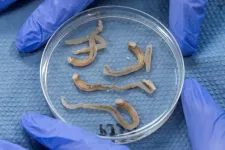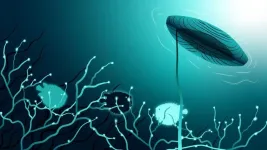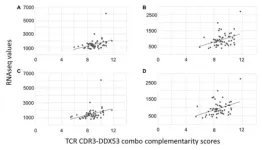(Press-News.org) PRESS RELEASE FROM THE UNIVERSITY OF CAMBRIDGE
EMBARGOED UNTIL 10:00 LONDON TIME (GMT) ON 20 NOVEMBER, 2023
[Photographs and a copy of the paper are available here]
These long, white saltwater clams are the world’s fastest-growing bivalve and can reach 30cm long in just six months. They do this by burrowing into waste wood and converting it into highly-nutritious protein.
The researchers found that the levels of Vitamin B12 in the Naked Clams were higher than in most other bivalves – and almost twice the amount found in blue mussels.
And with the addition of an algae-based feed to the system, the Naked Clams can be fortified with omega-3 polyunsaturated fatty acids - nutrients essential for human health.
Shipworms have traditionally been viewed as a pest because they bore through any wood immersed in seawater, including ships, piers and docks.
The researchers developed a fully-enclosed aquaculture system that can be completely controlled, eliminating the water quality and food safety concerns often associated with mussel and oyster farming.
And the modular design means it can be used in urban settings, far from the sea.
“Naked Clams taste like oysters, they’re highly nutritious and they can be produced with a really low impact on the environment,” said Dr David Willer, Henslow Research Fellow at the University of Cambridge’s Department of Zoology and first author of the report.
He added: “Naked Clam aquaculture has never been attempted before. We’re growing them using wood that would otherwise go to landfill or be recycled, to produce food that’s high in protein and essential nutrients like Vitamin B12.”
Scientifically named Teredinids, these creatures have no shell, but are classed as bivalve shellfish and related to oysters and mussels.
Because the Naked Clams don’t put energy into growing shells, they grow much faster than mussels and oysters which can take two years to reach a harvestable size.
The report is published today in the journal Sustainable Agriculture.
Wild shipworms are eaten in the Philippines - either raw, or battered and fried like calamari. But for British consumers, the researchers think Naked Clams will be more popular as a ‘white meat’ substitute in processed foods like fish fingers and fishcakes.
“We urgently need alternative food sources that provide the micronutrient-rich profile of meat and fish but without the environmental cost, and our system offers a sustainable solution,” said Dr Reuben Shipway at the University of Plymouth’s School of Biological & Marine Sciences, senior author of the report.
He added: “Switching from eating beef burgers to Naked Clam nuggets may well become a fantastic way to reduce your carbon footprint.”
The research is a collaboration between the Universities of Cambridge and Plymouth, and has attracted funding from sources including The Fishmongers’ Company, British Ecological Society, Cambridge Philosophical Society, Seale-Hayne Trust, and BBSRC
The team is now trialling different types of waste wood and algal feed in their system to optimise the growth, taste and nutritional profile of the Naked Clams – and is working with Cambridge Enterprise to scale-up and commercialise the system.
ENDS.
Reference
Willer, D.F. et al: ‘Naked Clams to open a new sector in sustainable nutritious food production.’ Sustainable Agriculture, Nov 23. DOI: 10.1038/s44264-023-00004-y
Contact details
Charis Goodyear, Communications Coordinator, Office of External Affairs and Communications, University of Cambridge Charis.Goodyear@admin.cam.ac.uk
Dr David Willer, Department of Zoology, University of Cambridge dw460@cam.ac.uk
About the University of Cambridge
The University of Cambridge is one of the world’s top ten leading universities, with a rich history of radical thinking dating back to 1209. Its mission is to contribute to society through the pursuit of education, learning and research at the highest international levels of excellence.
The University comprises 31 autonomous Colleges and 150 departments, faculties and institutions. Its 24,450 student body includes more than 9,000 international students from 147 countries. In 2020, 70.6% of its new undergraduate students were from state schools and 21.6% from economically disadvantaged areas.
Cambridge research spans almost every discipline, from science, technology, engineering and medicine through to the arts, humanities and social sciences, with multi-disciplinary teams working to address major global challenges. Its researchers provide academic leadership, develop strategic partnerships and collaborate with colleagues worldwide.
The University sits at the heart of the ‘Cambridge cluster’, in which more than 5,300 knowledge-intensive firms employ more than 67,000 people and generate £18 billion in turnover. Cambridge has the highest number of patent applications per 100,000 residents in the UK.
www.cam.ac.uk
END
Innovative aquaculture system turns waste wood into nutritious seafood
Researchers hoping to rebrand a marine pest as a nutritious food have developed the world’s first system of farming shipworms, which they have renamed ‘Naked Clams’
2023-11-20
ELSE PRESS RELEASES FROM THIS DATE:
Our cerebellar nuclei turn out to be more important than initially thought
2023-11-20
Associative learning was always thought to be regulated by the cortex of the cerebellum, often referred to as the “little brain". However, new research from a collaboration between the Netherlands Institute for Neuroscience, Erasmus MC, and Champalimaud Center for the Unknown reveals that actually the nuclei of the cerebellum make a surprising contribution to this learning process.
If a teacup is steaming, you’ll wait a bit longer before drinking from it. And if your fingers get caught in the door, you'll be more careful next time. These are forms of associative ...
Liver cancer rates are rising with each successive generation of Mexican Americans
2023-11-20
New research reveals that with each subsequent generation of Mexican Americans, the risk of developing liver cancer has climbed. Although Mexican Americans have experienced a growing trend in modifiable risk factors—such as increased alcohol consumption, higher smoking rates, and elevated body mass index—these factors alone do not entirely account for the increased risk of liver cancer as generations progress. The findings are published by Wiley online in CANCER, a peer-reviewed journal of the American Cancer Society.
US-born Latinos have a higher incidence of liver cancer than foreign-born Latinos, and a possible ...
Liver cancer rates increase in each successive generation of Mexican Americans, study finds
2023-11-20
In the United States, liver cancer rates have more than tripled since 1980. Some groups, including Latinos, face an even higher risk than the general population—but researchers do not fully understand why.
A study from the Keck School of Medicine of USC, funded by the National Cancer Institute, has shed new light on those disparities. Researchers found that among Mexican Americans, liver cancer risk rises the longer a person’s family has lived in the U.S. That increased risk primarily affected men. The ...
National Poll: Parents of young children increasingly turn to social media for parenting advice
2023-11-20
ANN ARBOR, Mich. – Potty training, getting kids to sleep and toddler tantrums are just some of the challenges parents of young children face.
And four in five parents in a new national poll say they go to the same place to discuss such parenting issues: social media.
Nearly half of parents rate social media as very useful for getting new ideas to try, according to the University of Michigan Health C.S. Mott Children’s Hospital National Poll on Children’s Health.
“Many parents turn to online communities ...
Reducing cyberattacks on Canadian health systems
2023-11-20
Cyberattacks targeting health information systems can cause considerable damage and stress, but there are ways to reduce the risk of these events, write authors in CMAJ (Canadian Medical Association Journal) https://www.cmaj.ca/lookup/doi/10.1503/cmaj.230436.
"With respect to cybersecurity, a bit of prevention is worth a terabyte of cure," writes Vinyas Harish, MD/PhD candidate at the University of Toronto's Temerty Faculty of Medicine, with coauthors, in an article outlining the impact of cyberattacks on Canadian health information ...
Alarming rates of suicidal ideation among older transgender adults revealed on Transgender Day of Remembrance
2023-11-20
Transgender adults aged 50 or older in the United States face a significantly elevated risk of contemplating suicide due to the compounding impact of various challenges in different areas of their lives, according to a population-wide study.
More than one-fourth (25.8%) of this large pool of older transgender people acknowledged having thought about ending their lives at least once the previous year.
That is a much greater prevalence than the 4.7% figure currently estimated for the adult population-at-large and substantially ...
Survey: from inflation to world affairs, stressors pile up for Americans this holiday season
2023-11-20
EMBARGOED UNTIL MONDAY, NOVEMBER 20 AT 12:01 A.M. EST
COLUMBUS, Ohio – The season of comfort and joy is upon us, but a new survey finds that for many Americans, it’s the season of stress and worry. A new survey commissioned by The Ohio State University Wexner Medical Center and College of Medicine finds Americans are feeling the strain from inflation and world affairs this year, in addition to other stressors that often come with the holidays.
Of the 1,007 survey respondents, 81% said that national issues and world affairs are causing them stress. In addition, 75% of respondents are ...
The way dogs see the world: Objects are more salient to smarter dogs
2023-11-18
When we point at an object, the toddler focuses on the object, while the dog usually takes the gesture as a directional cue. In a recent study, researchers from the Department of Ethology at Eötvös Loránd University find explanations for this phenomenon. It appears that the discrepancy is not only due to how dogs see, but may, in fact, reflect how they think. For "smarter" dogs, the appearance of an object matters as much as its location, suggesting that their information processing is more similar to that of humans.
Spatial bias is the phenomenon of interpreting information in relation to space, location ...
A potential early esophageal cancer antigen: DDX53
2023-11-17
“In this ESCA study, the possibility of an immune response that selected for tumor cells lacking the DDX53 CTA is discussed.”
BUFFALO, NY- November 17, 2023 – A new research paper was published in Oncoscience (Volume 10) on November 10, 2023, entitled, “An immunoinformatics assessment of the cancer testis antigen, DDX53, as a potential early esophageal cancer antigen.”
T-lymphocytes have been implicated in facilitating a pro-inflammatory, pro-tumorigenic microenvironment that worsens prognosis for esophageal carcinoma (ESCA). In their new study, researchers ...
TTUHSC’s La-Beck to study cancer drug delivery via nanoparticles
2023-11-17
To reduce the side effects associated with chemotherapy treatments, researchers have investigated the use of delivery systems that can take more drugs directly to the tumor. Ninh (Irene) La-Beck, Pharm.D., from the Department of Immunotherapeutics and Biotechnology at the Texas Tech University Health Sciences Center (TTUHSC) Jerry H. Hodge School of Pharmacy is one of those researchers.
La-Beck recently received a five-year, $2.49 million grant (“Cholesterol Metabolism in the Pharmacology of Liposomal ...
LAST 30 PRESS RELEASES:
The world’s largest brain research prize awarded for groundbreaking discoveries on how we sense touch and pain
Magnetofluids help to overcome challenges in left atrial appendage occlusion
Brain-clearing cells offer clues to slowing Alzheimer’s disease progression
mRNA therapy restores fertility in genetically infertile mice
Cloaked stem cells evade immune rejection in mice, pointing to a potential universal donor cell line
Growth in telemedicine has not improved mental health care access in rural areas, study finds
Pitt scientists engineer “living eye drop” to support corneal healing
Outcomes of older adults with advanced cancer who prefer quality of life vs prolonging survival
Lower music volume levels in fitness class and perceived exercise intensity
Of crocodiles, counting and conferences
AERA announces 2026 award winners in education research
Saving two lives with one fruit drop
Photonic chips advance real-time learning in spiking neural systems
Share of migratory wild animal species with declining populations despite UN treaty protections worsens from 44% to 49% in two years; 24% face extinction, up 2%
One in 20 babies experiences physical abuse, global review finds
Tundra tongue: The science behind a very cold mistake
Targeting a dangerous gut infection
Scientists successfully harvest chickpeas from “moon dirt”
Teen aggression a warning sign for faster aging later in life
Study confirms food fortification is highly cost-effective in fighting hidden hunger across 63 countries
Special issue elevates disease ecology in marine management
A kaleidoscope of cosmic collisions: the new catalogue of gravitational signals from LIGO, Virgo and KAGRA
New catalog more than doubles the number of gravitational-wave detections made by LIGO, Virgo, and KAGRA observatories
Antifibrotic drug shows promise for premature ovarian insufficiency
Altered copper metabolism is a crucial factor in inflammatory bone diseases
Real-time imaging of microplastics in the body improves understanding of health risks
Reconstructing the world’s ant diversity in 3D
UMD entomologist helps bring the world’s ant diversity to life in 3D imagery
ESA’s Mars orbiters watch solar superstorm hit the Red Planet
The secret lives of catalysts: How microscopic networks power reactions
[Press-News.org] Innovative aquaculture system turns waste wood into nutritious seafoodResearchers hoping to rebrand a marine pest as a nutritious food have developed the world’s first system of farming shipworms, which they have renamed ‘Naked Clams’








